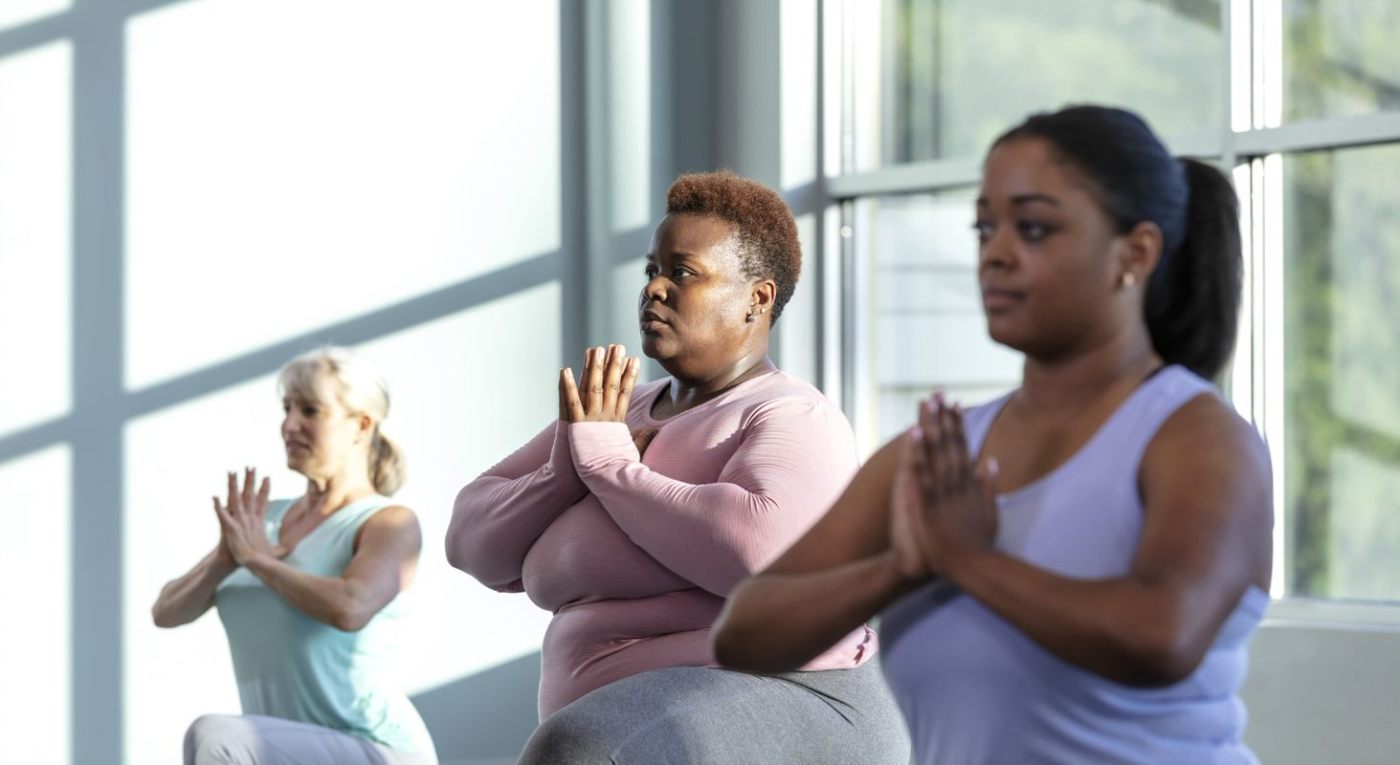Originating in India, the practice of yoga has gradually worked its way into the Western consciousness. Today, it is a common activity that is used to promote physical and emotional well-being, improve strength and to reduce stress. In a 2017 survey, one in seven Americans said they had practiced yoga in the past 12 months, according to the National Center for Complementary and Integrative Health.
Contrary to common depictions, yoga isn’t just for suburban white women. For instance, VA has embraced yoga as part of a Whole Health approach to better support Veterans who experience chronic pain or mental health challenges – in both women and men, of all racial and ethnic backgrounds. VA scientists are studying the effectiveness of yoga to remediate chronic back pain and improve quality of life in cancer survivors, among other conditions.
Now, VA investigators are examining the effectiveness of a clinical, trauma-sensitive yoga intervention to help women Veterans who experienced military sexual trauma (MST) and went on to develop posttraumatic stress disorder (PTSD).

Dr. Ursula Kelly is a psychiatric mental health nurse practitioner and research scientist at the Atlanta VA Health Care System.
Complementary and integrative therapy for PTSD
Dr. Ursula Kelly is a psychiatric mental health nurse practitioner and nurse scientist at the Atlanta VA Health Care System. She also is an associate professor of nursing at Emory University in Atlanta. Throughout her career, she has worked to understand the issues facing survivors of interpersonal violence and sexual trauma.
Kelly is the principal investigator for a five-year clinical trial that sought to examine the effectiveness of a specialized form of trauma-sensitive yoga to treat women Veterans who developed PTSD in relation to MST. The trial compared the effectiveness of Trauma Center Trauma-Sensitive Yoga (TCTSY) to cognitive processing therapy (CPT) – one of several gold-standard psychotherapies used to treat PTSD.
The interim results, published in the “Journal of Alternative and Complementary Medicine,” showed that TCTSY was equivalent to CPT in relieving PTSD symptom severity in this group of women Veterans. (You can view the team’s cyber-seminar presentation here.) In addition, the research team found that those in the TCTSY intervention showed an earlier reduction in PTSD symptom severity than CPT, which could help to combat a high drop-out rate for trauma-focused PTSD therapy.
“Both treatments resulted in clinically significant improvements in PTSD symptom severity, and in related outcomes. Yet, neither intervention was completely effective for everyone,” says Kelly. “What this research does is give women Veterans an additional treatment option, when they choose to pursue treatment for PTSD,” she adds.
More than 200 women Veterans enrolled in study
The trial had three aims: to reduce symptoms of PTSD, chronic pain and insomnia; to improve participants’ quality of life and social functioning; and to assess the mechanisms of action on PTSD – how yoga works to physiologically counteract the effects of PTSD.
The investigators enrolled over 200 women Veterans who were seeking care for PTSD related to MST at two sites: the Atlanta VA Health Care System and VA Portland Health Care System in Oregon; the number of women who were randomized was 131. The Veterans were randomized to two groups – the TCTSY arm received 10 weeks of 60-minute group yoga sessions. The CPT arm received 12 weeks of 90-minute CPT group therapy. Both groups were assessed four times during the trial – at baseline, mid-point, and two weeks and three months post-treatment – using multiple psychological measures.
The researchers also tested Veterans for biomarkers of inflammation, via blood draws, and for the neurological effects of stress using EKGs to measure heart rate variability. “With PTSD, there is inflammation in the body along with hyperreactivity – neurological pathways become dysregulated. There is a small amount of evidence that suggests yoga may counteract these effects on the body, on the nervous and immunological systems,” says Kelly.
More Information
Click here to read the full story.
Click here to learn more about VA research.
Topics in this story
More Stories
Watch the Under Secretary for Health and a panel of experts discuss VA Health Connect tele-emergency care.
The 2024 National Veteran Suicide Prevention Annual Report provides the foundation for VA’s suicide prevention programs and initiatives.
Theranostics is a specialized field of nuclear medicine that uses a two-pronged approach to diagnose and treat cancer.







Hello!
I’m a Veteran, I’m also a RYT. How can I help?
Is Yoga offered through the VA
Hi Traci,
Yoga is provided at some VA medical centers on a volunteer basis, through VA’s Whole Health program.
https://www.va.gov/WHOLEHEALTH/index.asp
You can ask your primary care physician or the patient care coordinator at your local VA medical center if they offer yoga or other complementary health programs.
The Whole Health Program also has a You Tube channel that posts a series of videos on meditation, yoga, and relaxation exercises.
https://www.youtube.com/hashtag/livewholehealth